Safely keep revision history, track and compare changes in Excel spreadsheets
Some disappointments are familiar to every Excel user. You or your colleagues may enter incorrect values or even delete critical data by mistake. MS Excel Track Changes feature comes with limitations: history of changes is periodically deleted, it does not do backups and works only for shared workbooks. How can you protect data without piles of backup copies or complicated macros?
XLTools Version Control add-in solves these problems and keeps your data safe:
- Track changes made to a workbook
- Review change log and see who modified the file and when
- Recover and roll back to any previous version
- Compare versions and highlight modified cells
- Store revision history in a Git repository on your own PC
Before you begin, add Version Control to Excel
Version Control for Workbooks is one of the 20+ features within XLTools Add-in for Excel. Works in Excel 2019, 2016, 2013, 2010, desktop Office 365.

How to enable Version Control in Excel and start tracking changes
XLTools Version Control add-in for Excel workbooks is a revision control, or a source control tool. It helps track changes to Excel files and gives a clear picture of who, how and when modified the document.
- Open a workbook
Click the Enable button on XLTools tab.
- In the Settings window, click Enable
Done, now you are tracking changes and history of the spreadsheet. Next, you can commit versions of the workbook.
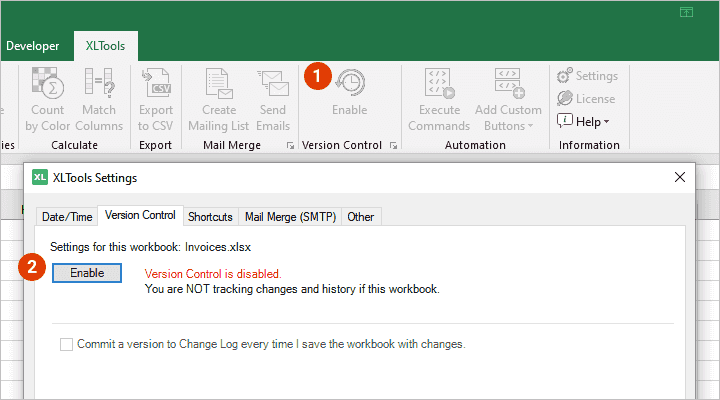
How to commit versions of Excel workbook to Change Log
Once you enable Version Control in a workbook, we recommend you commit the initial version to Change Log. This will allow you to compare future versions with it, as well as restore the initial version if necessary.
- Click the Commit Changes button
A dialogue box will open.
- Add a descriptive comment, e.g. "Initial version"
OK
Done, the initial version is saved to Change Log.
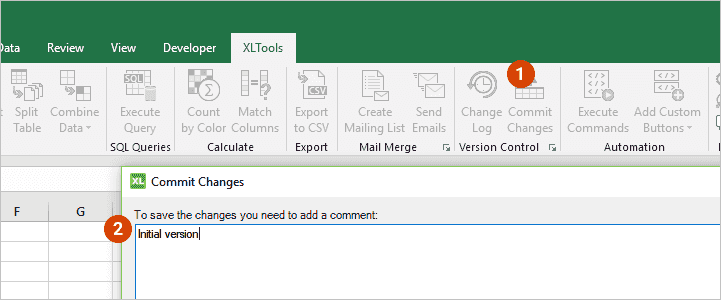
As you keep editing the workbook, keep committing versions along the way. We recommend you commit a version after any critical changes, or as often as often as you find necessary.
- Make changes
When ready to commit the version, click Commit Changes.
- Add a comment
OK.
- Open XLTools Settings
Version Control tab.
- Check the box "Commit a version to Change Log every time I save a workbook with changes".
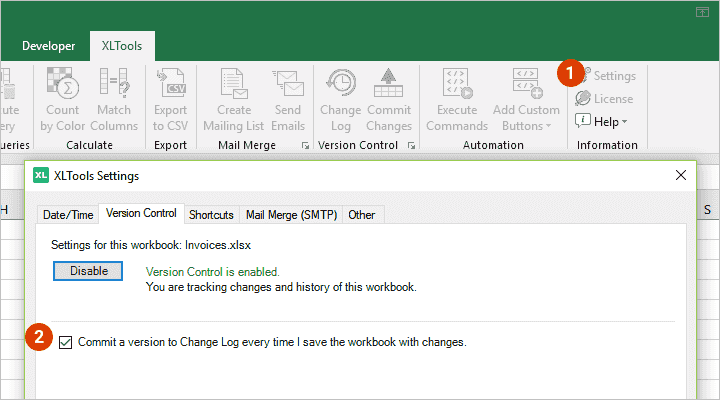
How to preview and diff recent changes before committing a version
- Edit the workbook
Click Commit Changes
A window will open.
- To preview and diff changes, double-click on the modified worksheet name in the list.
- A temporary file will open, and the Newer version will have the changed cells highlighted in red color.
- Review the result
Close the temporary file
Click OK to commit this new version, or Cancel to go back to editing the workbook.
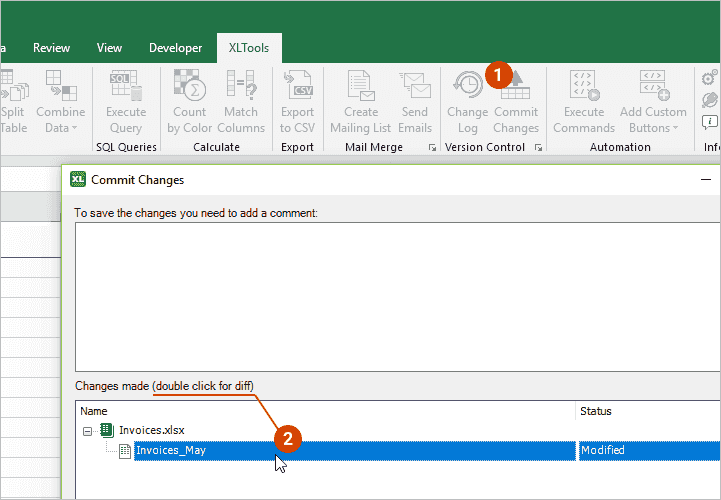
How Excel spreadsheet versions are saved to Git repository
All versions of a workbook that were committed to Change Log are saved to the Git repository on your computer. Being a widely adopted system for revision control, Git accurately records all changes and does not take much of your disk space.
Immediately after you enable Version Control, a folder 'WorkbookName_Revisions' is automatically generated in the same destination as the workbook. This is the Git repository that will safely store all revision history of the workbook. Every time you commit a version, it is saved to the repository.
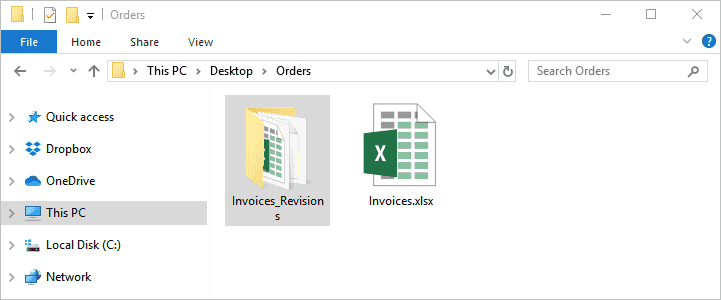
How to navigate the Change Log and see who made changes and when
The Change Log shows the list of all previously committed versions.
- Review the list of versions: it displays comments, authors and the time the version was committed. You can see who made changes and when.
- Filter the committed versions and search for the version you need. Type what you are looking for, and the search will run through version names, comments, authors and dates.
- Review the tools in the menu: you can expand and collapse the list, open, save, roll back to, diff and compare versions.
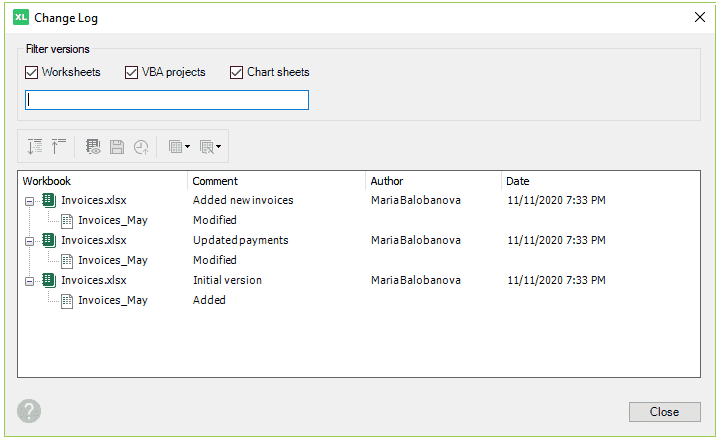
How to compare two versions of an Excel worksheet
You can easily compare two worksheet versions with each other:
- Click the Change Log button
The log will open.
- Hold the Ctrl key and select two worksheet versions you want to compare
In the log's menu, or in the right-click context menu, select Compare two selected versions.
![Version Control: how to compare worksheet versions]()
A temporary workbook will open. The sheet with the Newer version has the modified cells highlighted in red.
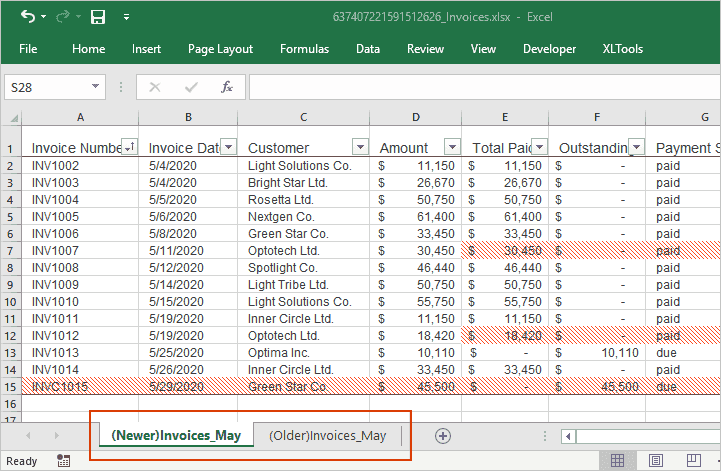
In the same way, you can compare any worksheet version with the previous or the current version:
- Click the Change Log button
Select any worksheet version.
- In the log's menu, or in the right-click context menu, select Diff with Previous version or Diff with Current version.
- A temporary workbook will open, and the modified cells will be highlighted.
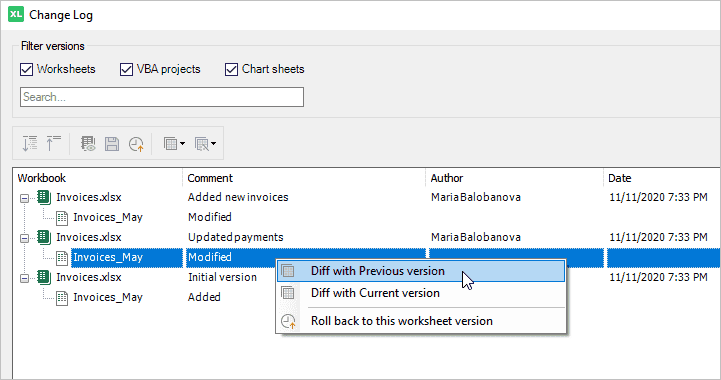
How to compare two workbook versions with Inquire Add-in
The Version Control tool is integrated with the Inquire plugin. It helps compare spreadsheet versions in more detail.
- Click the Change Log button
The log will open.
- Hold the Ctrl key and select two workbook versions you want to compare
In the log's menu, or in the right-click context menu, select Compare two selected versions in Inquire.
![Version Control: how to compare workbook versions with Inquire plugin]()
The result of the comparison will open in Inquire: review the changes to values, formulas, document structure, formats, etc.
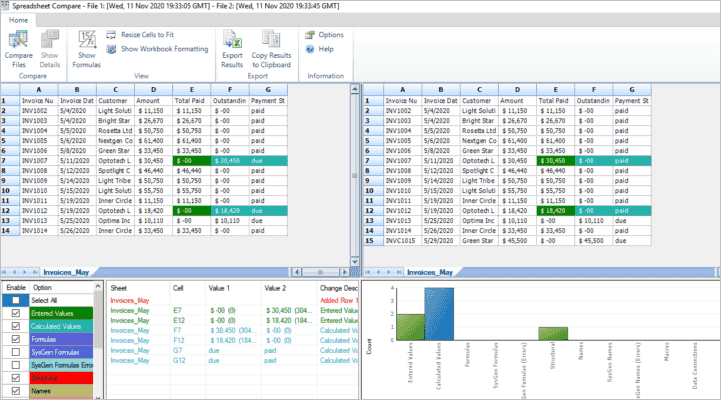
In the same way, you can compare any workbook version with the previous or the current version:
- Click the Change Log button
Select any workbook version.
- In the log's menu, or in the right-click context menu, select Diff with Previous version in Inquire or Diff with Current version in Inquire.
- The result of the comparison will open in Inquire.
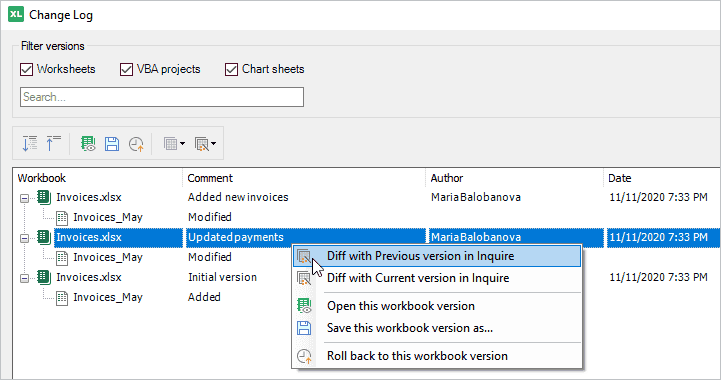
How to restore and roll back to a previous version of Excel workbook
To open, save or roll back to any previous workbook version:
- Click the Change Log button
Select the workbook version you need.
- In the log's menu, or in the right-click context menu, select the operation you need:
- Open this workbook version
- Save this workbook version as
- Roll back to this version
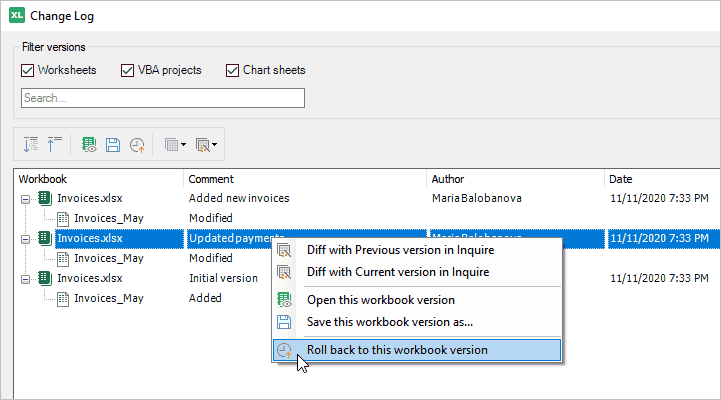
How to use Version Control for a shared Excel workbook
XLTools Version Control add-in helps arrange group work and collaborate on shared spreadsheets effectively.
- Make sure that all your team members have XLTools add-in installed on their PCs.
- Place the workbook in a shared folder on a local disk
Share the workbook with your team
Provide reading and writing permissions. This prevents anyone outside the group from editing the workbook under versioning.
- Each member can commit and compare versions and view the Change Log.
How to use Version Control for VBA macros in Excel
Limitations when using Version Control
When the spreadsheet is stored on a network folder or a cloud drive, Version Control may return file path errors (“pathname is too long”). In order to store revision history, the Git repository creates nested folders and sometimes the paths to these subfolders may exceed the limitation set in Windows.
Our development team is already searching for a workaround. In the meanwhile, we recommend you try and shorten the network path, as well as the name of the spreadsheet. Or, save the spreadsheets on the local disk on your computer.
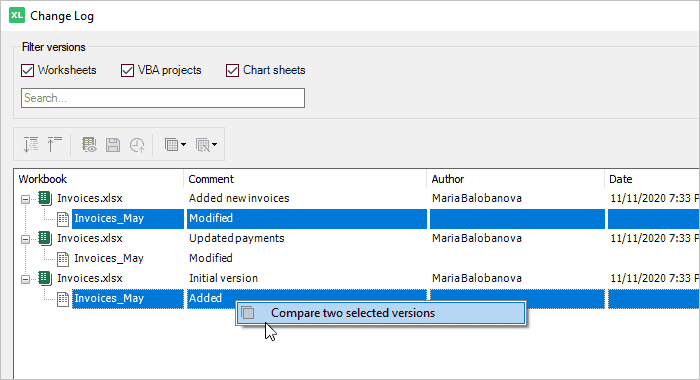
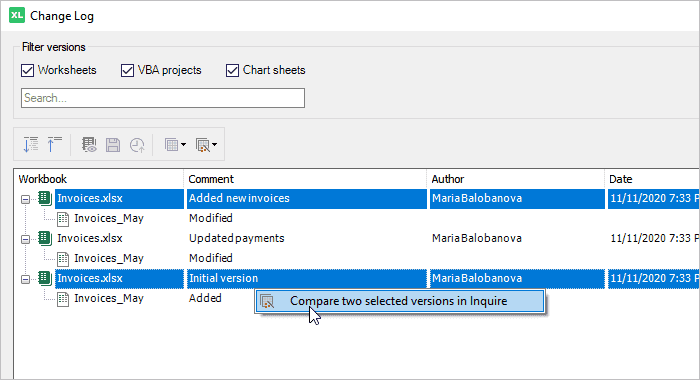
Hi Chuck, XLTools Version Control tracks changes to values in cells, i.e. the result of the formula, but not the formula itself. If by Userform code and modules you mean VBA code - then yes. Please see here.